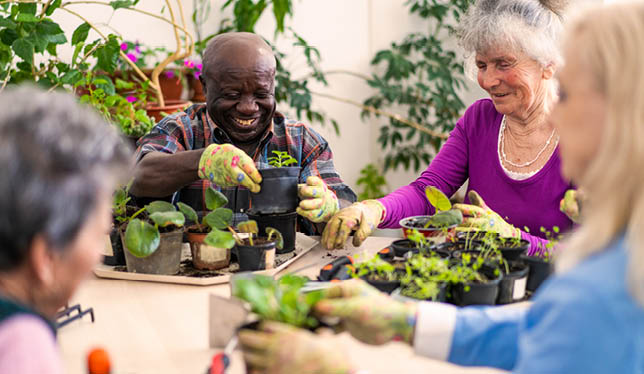Bringing experience to shape the future of post-secondary education
Retired faculty can stay involved in a myriad of ways.

The current state of post-secondary education in Canada and elsewhere is a source of concern for academic retirees as much as for current faculty and administrators. Retirees worry at least as much about the future of the academic enterprise as they do about their pensions and benefits. For many, the central features of academic life remain central to their lives and values as well.
In practical terms, the current financial challenges and the decline in public trust threaten the legacies that long-serving faculty have built. Concerned about the future in the digital age, as universities and colleges grapple with priorities in the face of budget cuts and the future of Artificial Intelligence, active retirees are beginning to ask how they can continue to contribute to their institutions.
Among retiree associations across Canada, some actions have begun to take shape and others are being discussed. Possible actions can be divided into several broad categories: helping students; mentoring younger faculty; explaining the value of post-secondary education, especially the humanities and social sciences; and, of course, continuing to teach, supervise and conduct research.
Continuing involvement in a university or college requires supportive administrations and active retiree organizations. Holding memories that reach to times before the COVID-19 pandemic and online courses, retirees can help recreate the community involvement that was a central feature of their careers. The academic marketplace in the 1970s and 1980s brought faculty together from across the country and, indeed, around the world. In most cases, we found supportive communities in our institutions. That sense of community was important for my wife and me when we moved to Toronto from the West Coast.
How can we help to recreate this in today’s world?
Supporting students
In these challenging times, students need financial and moral support. Retiree organizations can fund or endow scholarships, bursaries or other forms of practical assistance. The two retiree associations at my university, York, fund both graduate and undergraduate scholarships, as well as awards for Indigenous students and bursaries for students faced with emergencies. We have seen that these awards often serve as morale boosters. In recent years, we have contributed to the campus food bank and are now raising funds for special study spaces in the library.
Mentoring or tutoring is also a possibility. The York University Retirees Association has for some years been offering an annual session in which graduate students can present papers and receive constructive feedback from senior scholars prior to attending an academic conference. In addition, many retirees continue to supervise theses and dissertations.
Post-secondary institutions might also consider arranging tutoring assistance for students struggling with a particular subject. Intergenerational communication in an academic context can be beneficial to both.
Mentoring younger faculty
Mentoring is a service worthy of consideration. Many universities offer technical support for grant applications. Senior scholars could assist with this task. For myself, I could have benefited from a fuller briefing on the nature of fieldwork in Africa before I went into the field. Full-time faculty may lack specific expertise, or might simply welcome assistance. Seminars on graduate supervision and pedagogy could make use of senior scholars. The goal is not to replace full-time faculty but rather to provide assistance in hard times.
Advocating for post-secondary education
While active faculty and administrators must bear the primary burden for advocacy, academic retirees can provide a long-term perspective and may be more deeply embedded in their communities. Advocacy can include publishing books and articles on the value of a general education which, as one consultant put it, makes a person trainable. Many retired academics have taken on this task and made a good case for the humanities and social sciences. Engineers design better systems if they understand the people who operate them. Health care professionals benefit if they understand the hopes and fears of their patients. Citizens are better equipped to function in a democracy if they are aware of the structures involved.
Retired scholars are best equipped to make these arguments. However, books and articles only reach so far. As anyone who has studied campaign dynamics is aware, personal appeals are the most effective appeals. Retirees who are active in their communities, using the free time offered by their “permanent sabbatical,” are in a good position to explain to parents and grandparents what universities offer and the benefits of in-person education. We can clarify the different roles of colleges and universities and emphasize the benefits that go beyond acquiring the credentials needed for specific careers. The capacity to adapt, currently paramount, depends on a broad educational background.
In making these arguments, we can draw on our own backgrounds. Many of us switched majors as we learned the fields that really mattered to us. In my case, I found my calling in extracurricular activities that drew on my academic education. Many of us also were socially mobile. I was the first in my family to attend university.
Universities open doors. Those who have devoted much of our lives to them need to help keep them that way.
Featured Jobs
- Geography - Assistant Professor (Indigenous Geographies)University of Victoria
- Director and Stauffer-Dunning Chair, School of Policy Studies - Associate or Full ProfessorQueen's University
- Biochemistry, Microbiology and Bioinformatics - Faculty Position (Microbial Systems Biology, Omics Data Analysis)Université Laval
- Law - Assistant or Associate Professor (International Economic Law)Queen's University
- Sociology - Professor (Quantitative Data Analysis Methods and Social Statistics)Université Laval











Post a comment
University Affairs moderates all comments according to the following guidelines. If approved, comments generally appear within one business day. We may republish particularly insightful remarks in our print edition or elsewhere.